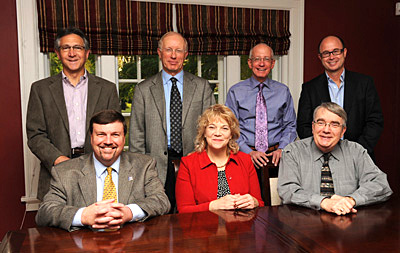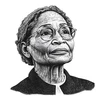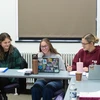|
They were joined by university administrators (seated, from left) David Ewing, dean of the College of Natural and Social Sciences; Virginia Horvath, vice president for Academic Affairs; and David Tiffany, vice president for University Advancement. Also serving on the advisory council are Dr. John Baust, ’65; Dr. Christopher Cahill, ’93; Dr. Amy Diegelman-Parente, ’95; Dr. Deborah Good, ’87; Dr. Norman Karin, ’76, ’78; Dr. David Mittlefehldt, ’73; Dr. Susan Schall, ’81; and Steve Schultz, ’72. |
SUNY Fredonia is tapping the minds of some of the most talented and successful science, technology and education professionals in the world to help design its new Science and Technology Center. Though they’re spread across the U.S., these 14 individuals share one common trait: all are SUNY Fredonia graduates.
These distinguished alumni returned to campus in late October as members of the university’s Natural Sciences Advisory Council to assist in the planning phase of the new Science and Technology Center, set to begin construction in 2011.
David Ewing, Dean of the College of Natural and Social Sciences, welcomes the opportunity to consult with these professionals as the university moves forward in designing its first new stand-alone academic facility built in 35 years. Their collective expertise is indeed impressive, encompassing science, research, science-technology business and patent law.
“All these folks are prominent in their field,” Dr. Ewing said.
Eight council members participated in the morning meeting with the architect, either in person or via telephone conference call, and four engaged in an informal panel discussion devoted to career paths with students in upper-level lab science classes that afternoon.
“We wanted to bring them up to speed on the Science and Technology Center and also elicit their input into what we’re thinking at the present time,” Ewing explained.
Several members offer expertise in planning new buildings at their respective institutions, which will be extremely valuable. High on Fredonia’s agenda is a facility that educates students for the “world of work” they will encounter, Ewing added.
“These folks have their pulse on different careers in science and know what the trends are, so they are in a good position to advise us,” he said. “Are we designing the right kind of facility to prepare students for careers in science down the road?”
Council members have already suggested ideas relating to curriculum and fundraising, among other areas, since forming at the 2007 Alumni Leadership Conference. Members have advocated an interdisciplinary approach in teaching science and technology and abundant hands-on experience.
An interdisciplinary approach that combines biology and chemistry is “the way you do science today,” said Dr. Christopher Mirabelli, ’77, managing director of a Boston venture capital firm within the healthcare industry. The whole idea is to put biology in the same facility with chemistry, the council member said, so students can collaborate on research and other projects.

 Natural Sciences Advisory Council: Four SUNY Fredonia alumni returned to campus to assist with the design phase of the campus’ new Science and Technology Center. They included (standing, from left) Dr. Michael Marletta, ’73, Dennis Costello, ’72, Dr. Christopher Mirabelli, ’77, and Dr. Jeffery Kelly, ’82.
Natural Sciences Advisory Council: Four SUNY Fredonia alumni returned to campus to assist with the design phase of the campus’ new Science and Technology Center. They included (standing, from left) Dr. Michael Marletta, ’73, Dennis Costello, ’72, Dr. Christopher Mirabelli, ’77, and Dr. Jeffery Kelly, ’82. 

